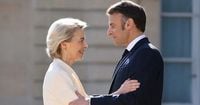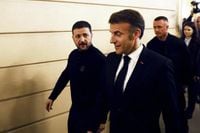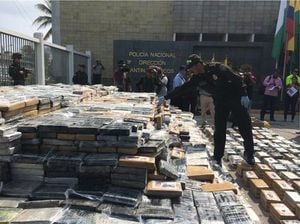On March 27, 2025, French President Emmanuel Macron emphasized the necessity for European troops to safeguard vital Ukrainian cities and strategic locations during a meeting in Paris with representatives from 30 nations and the European Union. The discussions focused on the potential deployment of military personnel to enforce a ceasefire with Russia, should one be established.
Macron articulated that the objective of these troops is not to engage directly with Russian forces but to provide Ukraine with the assurances needed to prevent Russia from repeating its aggressive actions from 2022 and the previous decade. He stated, "We must ensure that Russia never does again what it has done in the past ten years."
The proposed military presence, termed the 'Coalition of Bereidwilligen,' aims to deploy around 20,000 soldiers under the official name of the Multinational Force Ukraine (MFU). This contingent would be stationed in major urban centers and key strategic sites such as ports and energy facilities, ensuring security in areas critical to Ukraine's infrastructure.
In addition to ground forces, the plan includes the stationing of international naval ships to ensure unimpeded trade in the Black Sea and the deployment of combat aircraft to secure Ukrainian airspace. Furthermore, European troops would assist in training their Ukrainian counterparts in the western regions of the country.
However, not all nations present at the Paris meeting are in favor of contributing troops to the MFU. Italian Prime Minister Giorgia Meloni has firmly stated that Italy will not participate in any multinational force, while Dutch politician Geert Wilders has also expressed opposition to the idea. Despite this, the overall sentiment among the attendees is one of support for Ukraine, with leaders keen to demonstrate their commitment to the country and to reassure U.S. President Donald Trump of their responsibility in the matter.
Trump's backing is considered pivotal for the MFU, as the United States would need to guarantee assistance to the troops if necessary. However, American negotiator Steve Witkoff has voiced skepticism regarding the feasibility of a European troop presence, characterizing it as "simplistic" and suggesting that safety guarantees are unnecessary, given his belief that Putin has no intention of further territorial expansion in Ukraine. Witkoff's views align with those of the Kremlin, which has consistently opposed the deployment of international troops in Ukraine. Russian Foreign Minister Sergey Lavrov recently reiterated, "The stationing of troops, whether under EU or national flags, is unacceptable to us."
Former Ukrainian Foreign Minister Dmytro Kuleba responded to these developments, asserting that Russia does not genuinely seek peace. He remarked, "Putin does not want international troops in Ukraine, nor does he want Ukraine to receive weapons. He wants it left to its fate so he can destroy it more easily." Kuleba expressed doubt that a force of 20,000 troops, positioned away from the front lines, would deter Putin's aggression, asking rhetorically, "Do you think Putin will stop firing missiles just because there are foreign troops in cities?" Despite his skepticism, Kuleba acknowledged that European leaders are beginning to recognize the necessity for a more substantial commitment, noting that the presence of a 'Geruststellingsmacht' is more than merely symbolic.
He stated, "European voters will become accustomed to the idea of troops in Ukraine. They will realize that we are brothers in arms, defending this continent together." This acknowledgment reflects a growing understanding among European nations of the need to bolster Ukraine's defenses in the face of ongoing Russian aggression.
Meanwhile, the European Union has committed to supplying Ukraine with 2 billion bullets to support its ongoing military efforts against Russia. This ammunition is part of a broader response to Putin's Black Sea strategy, which seeks to leverage the cessation of hostilities in exchange for re-engagement with the international payment system Swift. The EU's provision of military supplies is seen as a direct counter to these demands, with the total cost of the ammunition estimated at 5 billion euros, which the EU plans to distribute among its member states.
In addition to the ammunition, Ukraine is set to receive an 18 billion euro loan from the G7, underscoring the international community's commitment to supporting Ukraine's defense. British Prime Minister Keir Starmer and Macron have agreed to collaborate on further developing the plan for the MFU, leading a group of 29 government leaders, including heads of NATO, the European Commission, and the European Council, along with Ukrainian President Volodymyr Zelensky. Their collective goal is to strengthen Ukraine's position before any potential peace negotiations.
Starmer remarked, "Russia is playing games and stalling for time. This is a classic strategy of Putin," reinforcing the sentiment among European leaders that pressure on Moscow must be maintained. Dutch Prime Minister Dick Schoof echoed this sentiment, advocating for the implementation of punitive measures against Russia rather than easing existing sanctions.
As tensions continue to escalate, the stakes remain high for the EU, with the potential for division between Russia and the U.S. if European nations fail to meet the demands of both powers. Correspondent Stefan de Vries highlighted the critical nature of the discussions in Paris, warning that failure to address these demands could lead to a narrative that the EU does not desire peace, a notion that both Putin and Trump could leverage to undermine the unity of the European bloc.
In conclusion, the path forward for Ukraine and its allies remains fraught with challenges. The proposed deployment of European troops, while met with skepticism from some quarters, signals a significant shift in the willingness of European nations to take a more active role in ensuring Ukraine's security amidst ongoing hostilities. As the international community rallies to support Ukraine, the implications of these decisions will resonate far beyond the borders of Eastern Europe.






